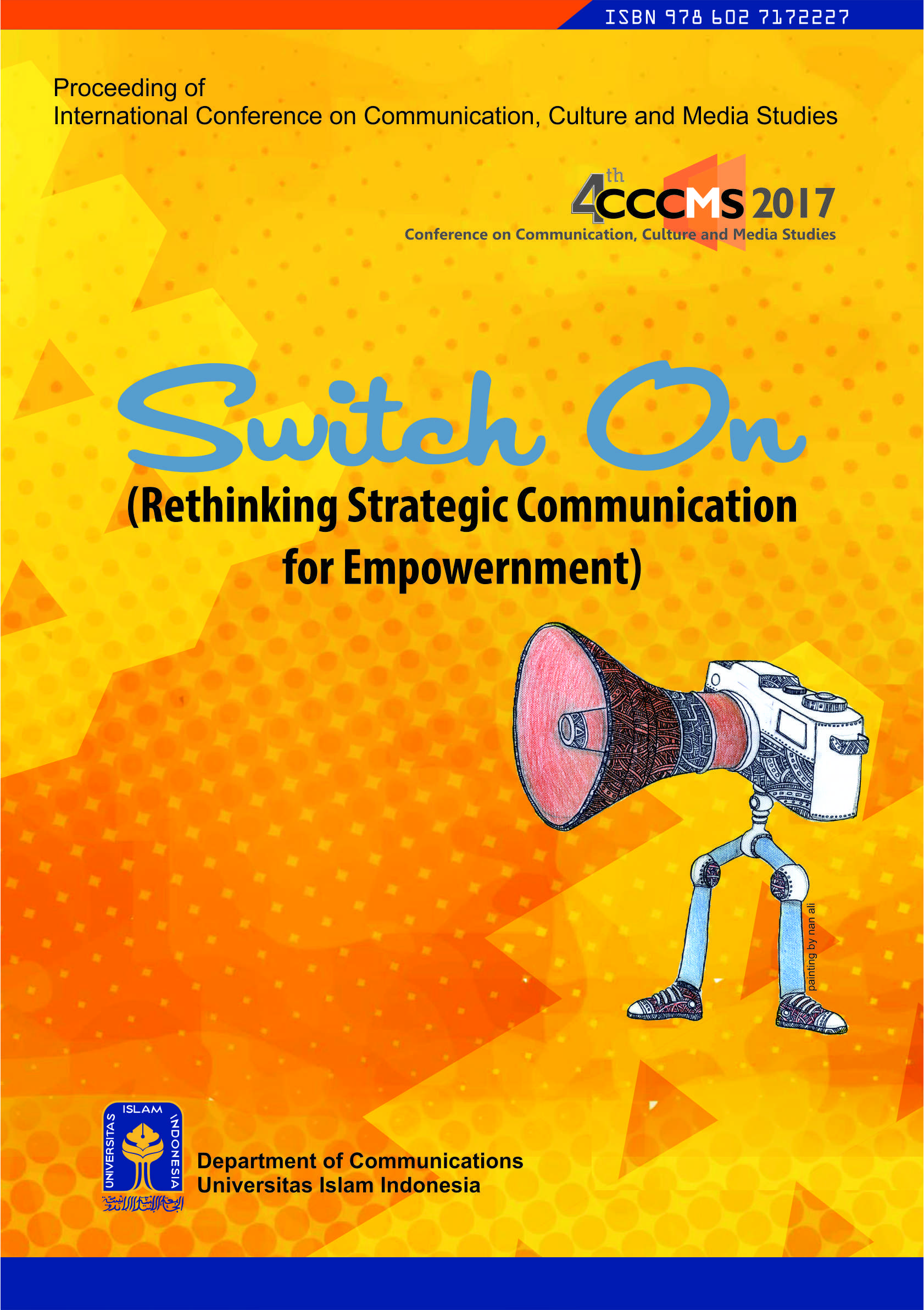Main Article Content
Abstract
Muslims have specific products and services preference that affected by their syariah-based needs. In the tourism sector, the growth of Muslim tourists continues to increase and projected to continue to grow. South Korea sees this as an opportunity and try to engage an Islamic branding campaign with Muslim Friendly Korea as a campaign to promote the country's tourism. The purpose of this study is to find out how South Korean government builds a tourism brand with the concept of halal tourism to attract large Muslim market through food products in South Korea. Given South Korea has been worldwide known by the entertainment industry or Korean pop culture that has been worldwide. As well as typical South Korean food that uses lots of pork and alcoholic beverages where it is forbidden to Muslims. This research uses qualitative approach, with document analysis method. The literature review as the data analyzed is obtained from the official website of the South Korean tourism organization, articles, books, journals and videos. Results of this study indicate that South Korean government, through the Korea Tourism Organization (KTO) do some ways to build a Muslim friendly tourism in South Korea through food products. Such as, provide official site of South Korean tourism that has information about culinary with halal label. KTO also organizes an event, named halal Restaurant Week. Besides that, a mobile phone application was also made to facilitate Muslim travelers who wants to find information about halal restaurant, barcode scanning food products to indicate halal food products and direction for worship place and schedule.
Keywords: Islamic branding; Korean tourism; Muslim tourists; communication promotion
Article Details
References
- Atkin, Douglas. (2006). MembangunKesetiaanMerek. Yogyakarta: B First
- Farhan, Afif. (2016). Korea Selatan Makin KebanjiranTuris Indonesia. Retrieved from https://travel.detik.com/travel-news/d-3370322/korea-selatan-makin-kebanjiran-turis-indonesia
- Korea Tourism Organization. (2017). Muslim-Friendly Restaurant in Korea. Retrieved from http://english.visitkorea.or.kr/e_book/access-e/ecatalog_pt2.jsp?Dir=548&catimage=&cpage=&callmode=
- Korea Tourism Organization. (2016). Korea: Muslim Friendly Destination. Retrieved from https://www.youtube.com/watch?v=4duLuTTXc3U
- Lipka, Michael. (2017). Muslims and Islam: Key findings in the U.S. and around the world. Retrieved from http://www.pewresearch.org/fact-tank/2017/08/09/muslims-and-islam-key-findings-in-the-u-s-and-around-the-world/
- Marianti. (2016).Hotel di Korea Selatan Sediakan Menu Halal bagiWisatawan Muslim. Retrieved from http://www.republika.co.id/berita/gaya-hidup/wisata-halal/16/12/01/ohhez8301-hotel-di-korea-selatan-sediakan-menu-halal-bagi-wisatawan-muslim
- MasterCard &CresentRating. (2015). Global Muslim Travel Index 2015.Retrieved from http://gmti.crescentrating.com/
- Pawito. (2007). Penelitian Komunikasi Kualitatif. Yogyakarta: LKIS
- Pew Research Center. (2015). The Future of World Religions: Pupolation Growth Projections, 2010-2050. http://www.pewforum.org/files/2015/03/PF_15.04.02_ProjectionsFullReport.pdf
- Rofi’i, Sunhadji. (2010). Pengertian Halal dan Haram dalamAjaran Islam. Retrieved from http://www.halalmuibali.or.id/pengertian-halal-dan-haram-menurut-ajaran-islam/
- Temporal, Paul. (2011). Islamic Branding and Marketing:Creating A Global Islamic Business. Singapore:John Wiley & Sons
References
Atkin, Douglas. (2006). MembangunKesetiaanMerek. Yogyakarta: B First
Farhan, Afif. (2016). Korea Selatan Makin KebanjiranTuris Indonesia. Retrieved from https://travel.detik.com/travel-news/d-3370322/korea-selatan-makin-kebanjiran-turis-indonesia
Korea Tourism Organization. (2017). Muslim-Friendly Restaurant in Korea. Retrieved from http://english.visitkorea.or.kr/e_book/access-e/ecatalog_pt2.jsp?Dir=548&catimage=&cpage=&callmode=
Korea Tourism Organization. (2016). Korea: Muslim Friendly Destination. Retrieved from https://www.youtube.com/watch?v=4duLuTTXc3U
Lipka, Michael. (2017). Muslims and Islam: Key findings in the U.S. and around the world. Retrieved from http://www.pewresearch.org/fact-tank/2017/08/09/muslims-and-islam-key-findings-in-the-u-s-and-around-the-world/
Marianti. (2016).Hotel di Korea Selatan Sediakan Menu Halal bagiWisatawan Muslim. Retrieved from http://www.republika.co.id/berita/gaya-hidup/wisata-halal/16/12/01/ohhez8301-hotel-di-korea-selatan-sediakan-menu-halal-bagi-wisatawan-muslim
MasterCard &CresentRating. (2015). Global Muslim Travel Index 2015.Retrieved from http://gmti.crescentrating.com/
Pawito. (2007). Penelitian Komunikasi Kualitatif. Yogyakarta: LKIS
Pew Research Center. (2015). The Future of World Religions: Pupolation Growth Projections, 2010-2050. http://www.pewforum.org/files/2015/03/PF_15.04.02_ProjectionsFullReport.pdf
Rofi’i, Sunhadji. (2010). Pengertian Halal dan Haram dalamAjaran Islam. Retrieved from http://www.halalmuibali.or.id/pengertian-halal-dan-haram-menurut-ajaran-islam/
Temporal, Paul. (2011). Islamic Branding and Marketing:Creating A Global Islamic Business. Singapore:John Wiley & Sons
